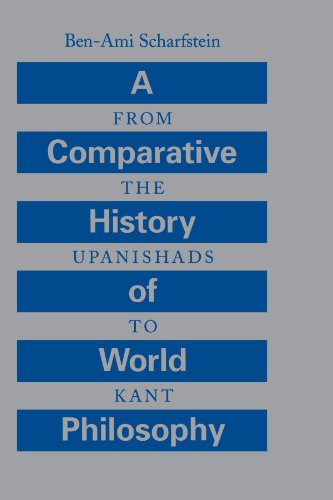A Comparative History of World Philosophy: From the Upanishads to Kant
Scharfstein, Ben-Ami
About the Book
Description:
Seller Inventory # hafa_Silver_0791436845
About this title:
Synopsis: A Comparative History of World Philosophy presents a personal yet balanced guide through what the author argues to be the three great philosophical traditions: Chinese, European, and Indian. The book breaks through the cultural barriers between these traditions, proving that despite their considerable differences, fundamental resemblances exist in their abstract principles. Ben-Ami Scharfstein argues that Western students of philosophy will profit considerably if they study Indian and Chinese philosophy from the very beginning, along with their own. Written with clarity and infused with an engaging narrative voice, this book is organized thematically, presenting in virtually every chapter characteristic views from each tradition that represent similar positions in the core areas of metaphysics and epistemology. At the same time, Scharfstein develops each tradition historically as the chapters unfold. He presents a great variety of philosophical positions fairly, avoiding the relativism and ethnocentrism that could easily plague a comparative presentation of Western and non-Western philosophies.
From the Author: During the years when I was writing A Comparative History of World Philosophy I was, first, educating myself and, second, carrying on a dialogue with a possible reader. Though alive only in my imagination, this reader was very real to me. I felt that I had to satisfy both of us. But because my voice was that of one human being talking to another, I could not write in the wooden, impersonal style of so many textbooks and encyclopedias. And because the philosophers, the subjects of the conversation, were so different from both of us and from one another, each of them had to have had to be shown to have an individual array of arguments put in an unmistakably individual style. Attentive to the cultural boundaries that were being crossed, my real imaginary reader kept asking me, "How can I be sure that you've got this argument right?" I had to confess now and then that I was not quite sure, and I always obliged myself to give references so that the reader could check my sources and judge independently. It was also crucial to me to organize the history so as to make comparisons easier, more natural, and more exact. I won't go through the difficulties that stand in the way of a plausible comparative history, or repeat the rewarding discoveries that I made, for myself and my reader. Of course, such a history faces stubborn old problems. How many identifiable philosophical cultures have there been? Has philosophy been essential to human culture? Has it in any way made general progress? Is the conception of philosophy basically the same in the different philosophical traditions; and what, in this context, can "basically the same" mean? Are Eastern philosophies as a whole different from those of the West? Has one philosophical culture been superior, in particular or in general to another? I've dealt with such problems carefully and, I hope, reasonably. Considering their age, importance, and difficulty, they deserve to be answered with careful respect. It's been and remains a great adventure!
Ben-Ami Scharfstein
Bibliographic Details
Title: A Comparative History of World Philosophy: ...
Publisher: State University of New York Press
Publication Date: 1998
Binding: Soft cover
Condition: very good
